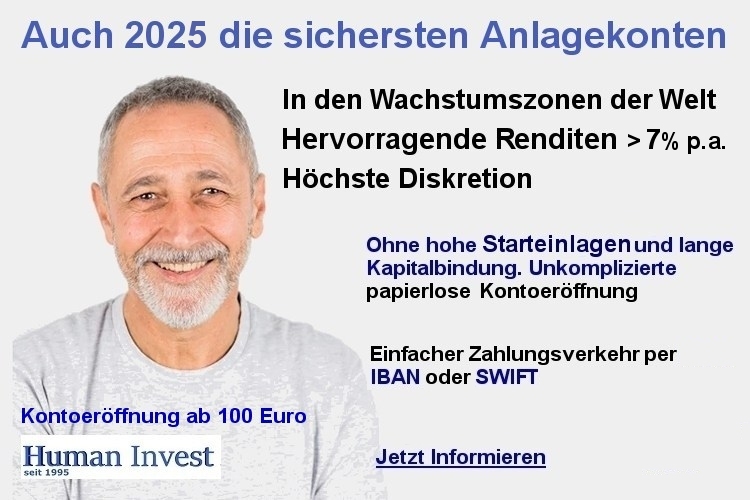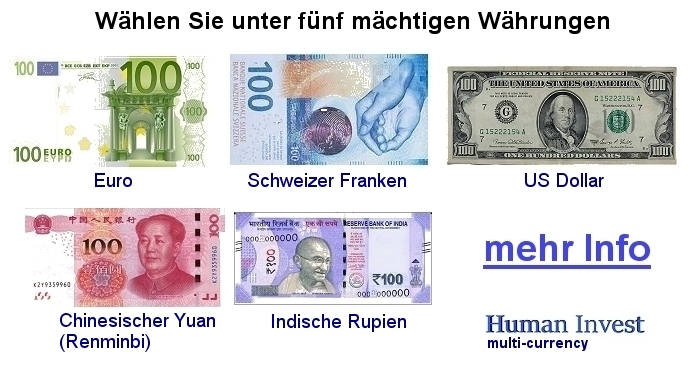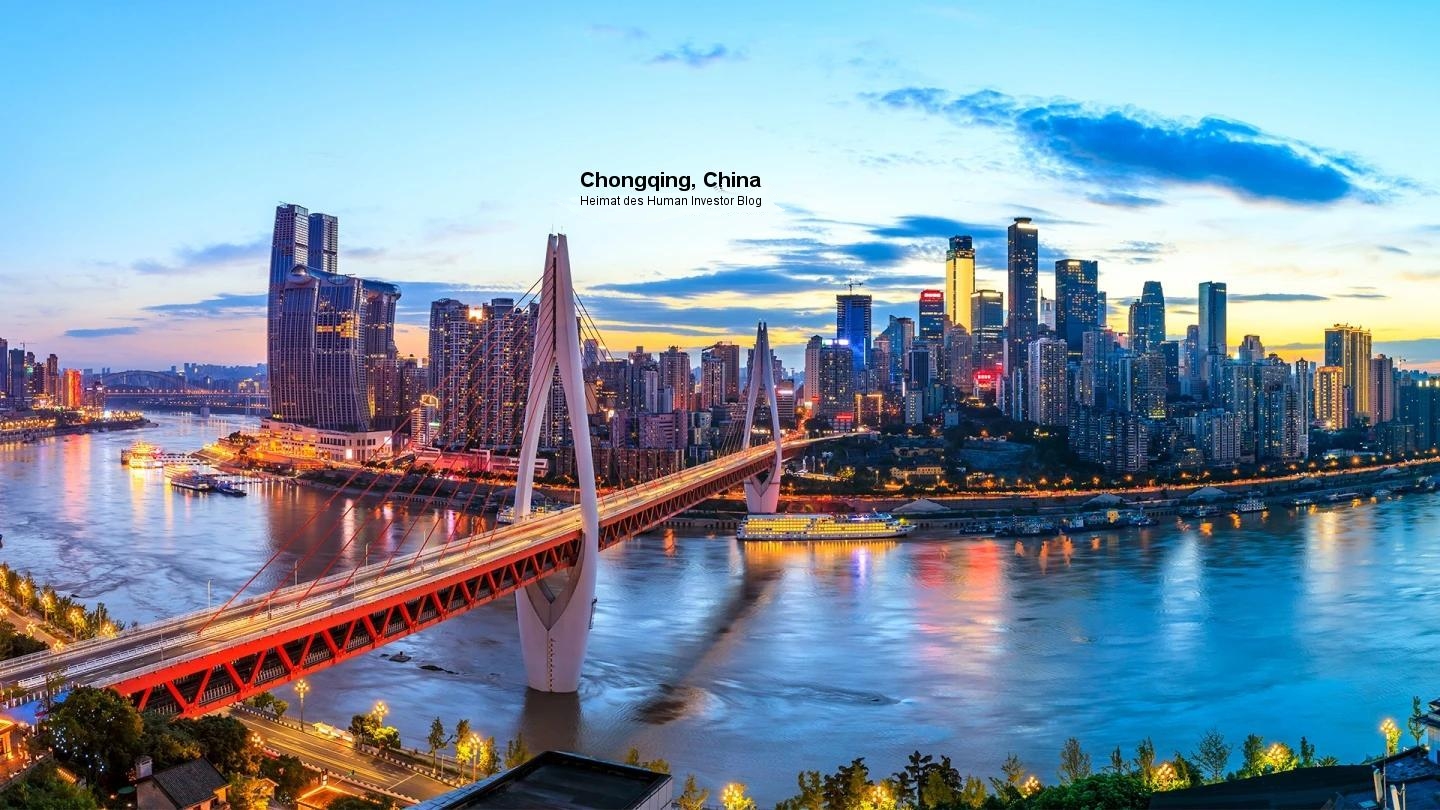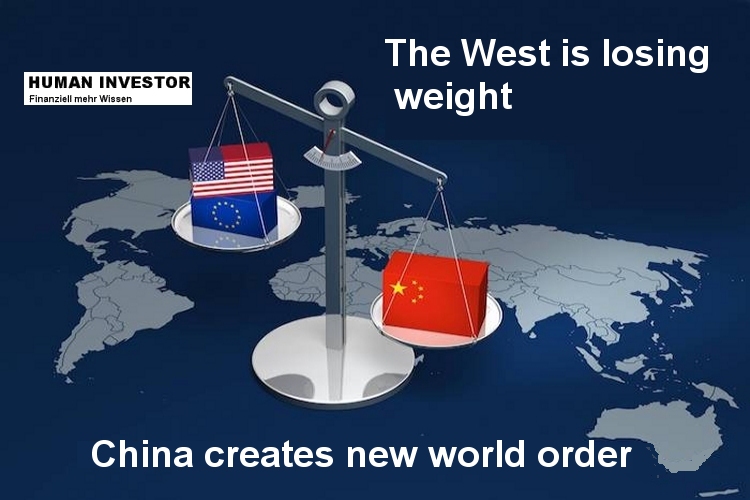This is the English version of an article in our swiss-chinese blog. However, all linked pages are exclusively in German. The original German edition can be found here.
Probably the most important German China expert, Frank Sieren, is harsh on the West. China has long been a world power. But Western countries are unable to position themselves. In an interview with freelance author Clemens Sarholz, Frank Sieren therefore explains the mistakes that German Foreign Minister Annalena Baerbock and EU Commission President Ursula von der Leyen make on the international political stage – and he shows what Angela Merkel has done better. First and foremost, Sieren believes, the EU must agree on a common strategy.
The opinion from Frank Sieren counts, so he is one of the leading German China experts. The journalist, author and documentary filmmaker has lived in Beijing since 1994. Since then he has worked for the „Süddeutsche Zeitung“, the „Wirtschaftswoche“, the „Zeit“, the „Handelsblatt“ and many other German media. He has also published several Spiegel book bestsellers.
But despite his great China expertise, Human Investor becomes, in this specific case the employees of our in Chongqing (China). resident „think tanks“ whose statements are critically examined, evaluated and, if necessary, presented from a different point of view.
What are China’s intentions?
Frank Sieren: China wants to be as big and powerful as it was at the beginning of the 19th century, with a 30 percent share of the global economy. And China wants to be in a position where it can do what it wants again without other countries interfering and getting in its way. What it traditionally doesn’t want: to convince other countries of its political system and its values.
That’s the old idea of the „Middle Kingdom“. China saw itself as the center and everyone else was barbarians. You didn’t have to worry about them, they were allowed to pay tribute, but they didn’t look into China’s business.
What do these intentions mean for the global power order?
That for the first time a multipolar world order is emerging. This means that, as has been the case for centuries, the minority of the West can no longer dictate the rules of the game for the majority of the world. This is a development that can justifiably be described as epochal.
Human Investor agrees with the statements made by Frank Siren. As early as mid-2022, there was our much-noticed blog article, “Zeitenwende“ (Turning Point), in which we ventured a look into the future. However, we do not call it the power order, but simply the new coming world order. Many blog posts by Human Investor have already commented on this article.
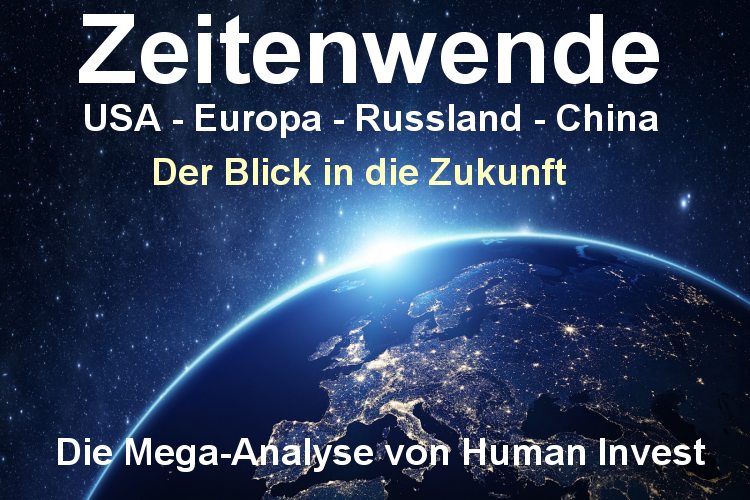
If you look at the forecasts, you read again and again that China’s population will shrink by about half by the year 2100. Can China therefore achieve its goals at all?
We don’t know because we can’t yet reliably assess how artificial intelligence, digitization and automation will affect labor requirements. It can even be an advantage to have fewer people. Namely, when in the economy, and that is no longer so unrealistic, the work is mainly done by AI and robots.
This development is the subject of various research teams: How can one achieve such good economic growth with fewer (young) people that the old get a good pension? So it’s about taxing the winners of robotization to give the money to the elderly. Old people themselves are not a problem. Poor old people are a problem.
And if this calculation doesn’t add up, the Chinese still have a joker that the Americans and many Western countries have drawn long ago: They can still become an immigration country. If things get tight, Beijing could decide from one day to the next to open the gates to young neighbors.
In addition, Human Investor would like to draw particular attention to the ASEAN community of states, which borders on China and has a very young and relatively well-educated population. The ASEAN countries have been the main area of work of our parent company Human Invest for more than 20 years, so that we can assess the situation there very competently. Read our blog article on ASEAN.
Jörg Wuttke, the outgoing President of the European Chamber of Commerce, recently said in the FAZ that China will definitely not overtake the USA in the next few years. Is he right?
I know Jörg Wuttke well and I’m surprised he said that. In terms of purchasing power, which is the more realistic way to measure gross domestic product, China has been larger than the US for a number of years (see here). However, neither the Americans nor the Chinese want to use this measuring instrument. Americans don’t want to be overtaken and the Chinese want to be seen as smaller than they are.
I don’t see a realistic scenario in which growth would collapse in the near future. China generated a trade surplus of over 60 billion per month in the first half of 2023. The US runs a deficit averaging $68 billion – per month.
Human Investor finds Mr. Wuttke’s opinion downright ridiculous. What Mr Siren fails to address in his response, however, is the enormous US debt to China. This is of course based on the above correctly presented numbers. Every year, the US borrows more money from China by selling government bonds. The question remains how long this will continue. You can find all information about the US debt to China in a separate blog article.
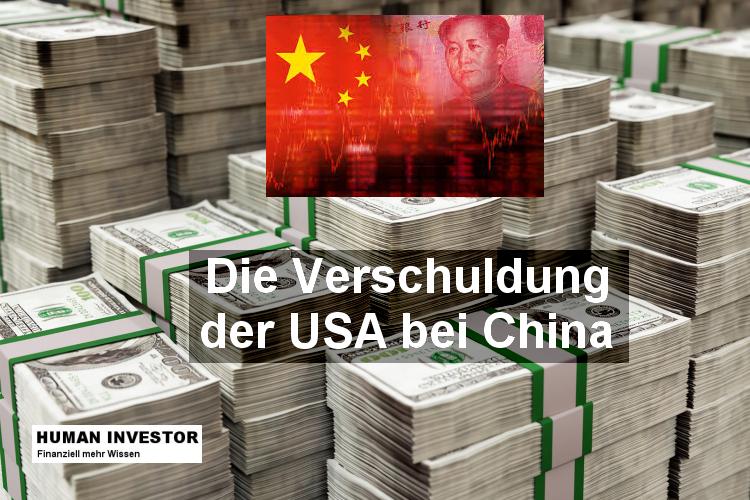
Even if it comes to war with Taiwan?
That would be a war nobody wants. The disadvantages would be too great. Over 60 percent of all computer chips in the world are made in Taiwan. A war would mean that the entire world economy would come to a standstill. Two years ago we saw what damage a ship that has gone wrong can do. Nobody really wants a Taiwan war. Neither does Beijing. The price for that would be too high.
China accounts for 18 percent of the world economy. At 2.8 percent, Putin has much less to lose. You only take such a risk if you have your back against the wall and bet everything on one card. So a major economic crisis or political unrest in the country, and I don’t see either at the moment.
However, Human Investor is certain: the integration of Taiwan into the home country will come, even if a time horizon of 10-20 years should be set for this at the moment. It will happen at a time when China has become much more powerful economically and militarily, while the USA has continued to make extreme cuts in many areas. The entire West will no longer have the strength and will to oppose the incorporation of Taiwan into China, or to uselessly waste its energies in a useless cause (like the Ukraine war now). Read our detailed blog post on the so-called Taiwan „crisis“ here.
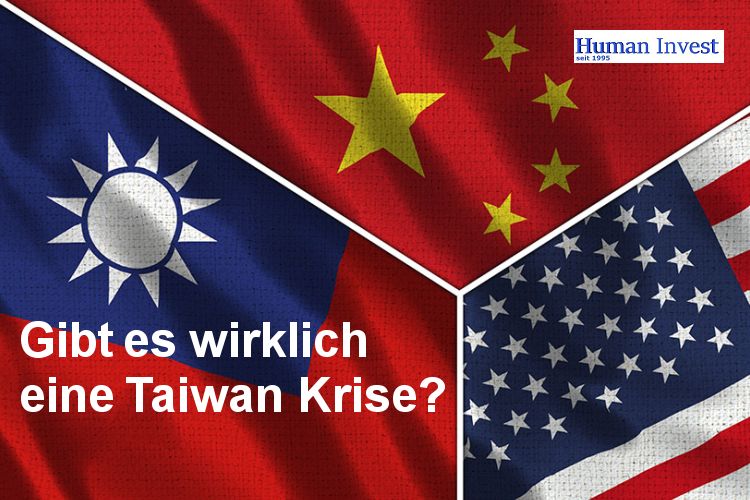
There are observers who say that China will suffer an economic crisis in the next three to five years.
I don’t see the big trend changing: China is getting stronger, the US weaker in relative terms. Economic crises do not fall from the sky. They announce themselves for a long time. You have a trade deficit. You go into debt abroad to pay for your purchases. If that is no longer enough, you go to the savings account. For countries, these are the foreign exchange reserves. When they’re gone, money is printed – and inflation shoots up. Growth collapses. China, on the other hand, is achieving one record surplus after another, has hardly any foreign debt, very high, stable foreign exchange reserves, no inflation, and growth of over five percent. The internal debts are high, but they don’t matter as long as you don’t have to take on foreign debt.
Human Investor also notes that the World Bank has forecast GDP growth of 4.5% for China in 2023 compared to the previous year. China itself set a realistic growth target of 5.0% due to the „corona aftermath“. This is far less than the annual growth of around 8% achieved in previous years. However, to speak of an (coming) economic crisis here, also with reference to Corona, is pure economic polemics.
In the meantime, 6.5% has been reached again in China. In the USA, on the other hand, growth (always compared to the previous year) has collapsed from 2.2% in January 2022 to the current 1.1%. So it’s already been reduced by half. Germany, on the other hand, fell into recession with an adjusted GDP of -0.3%. The same is now expected in the USA due to the permanent increases in key interest rates that are hostile to growth. The current growth in China is 20 times higher than in Germany and still around 6 times higher than in the USA.
In the meantime, economic articles in the German media no longer mention growth compared to the same month in the previous year. It is calculated for the current previous month in order to improve the results at least a little.
How do you determine that the global balance of power is fluctuating?
The West no longer gets a majority in the G20. The BRICS countries already have slightly greater economic power than the G7 and represent 40 percent of the world’s population, while the G7 countries represent only 10 percent.
Last year, Joe Biden invited the ASEAN countries to Washington. These are small countries that together are as big economically as Japan. They didn’t even go there and said: „We’d be happy to meet you when we can discuss what we’re going to do together. But we won’t meet you if you want to determine how we deal with other countries.“ And this is a completely new development.
It comes as a huge surprise to me that these rising countries like China, India, Brazil, regardless of their political systems and level of economic development, are now banding together to prevent the western minority from setting the rules of the game for the majority of the world.
Human Investor would like to add that it is not just the BRICS countries that are setting new trends today with the participation or leadership of China. Human Investor’s „think tank“ classifies the new economic alliances such as the Shanghai Five and the RCEP as even more powerful. The RCEP in particular, to which countries such as Japan are already politically „aligned“ with the West, will continue to make a name for itself in the future. Get more information about the new Asian economic alliances here.

What role does Germany and Europe play in this?
Many politicians are still trying to somehow keep the old world order. But that cannot be maintained. It’s a bit like the nobility and bourgeoisie in the 19th century. The nobility, as a minority, determined the rules of the game for the majority. And at some point the citizens rebelled against it. That was the beginning of the descent of the nobility. The cunning nobles have teamed up with the rising commoners. The narrow-minded nobles remained stubborn towards the climbers and have lost their power.
And Germany remains stubborn?
In any case, we underestimate the speed at which we are losing importance, as is the whole of Europe. We have not understood that we have to move in global power relations that are changing. This also applies to the economy.
For many years we could make whatever we wanted. It was the best quality in the world and bought it. Germany was the safest country, the country with the best social system, the country with the best hidden champions, with the best cars and so on. Those days are over. Everything is being put into perspective.
This world order of the Golf generation, in which this wealth is taken for granted, is currently dissolving. And instead of using the opportunities of the changing world order and contributing our interests to this new world order, we try with all our might to stick to it. The prototype of this policy in Germany is Annalena Baerbock.
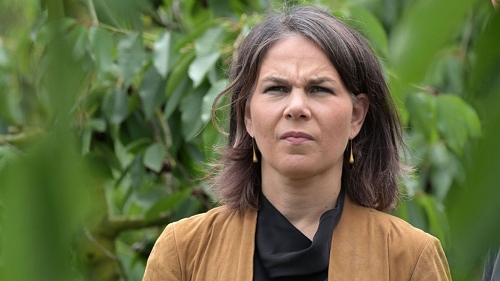
What do you mean?
She represents a value-based foreign policy that assumes that the world should behave as she and parts of her party see fit. We determine the value-based world order, the others have to stick to it, otherwise they will be hit with sanctions. She’s probably acting with good intentions. But she completely misjudges the real balance of power. The majority of the world is no longer forced to do what we want.
In addition, she does not have a majority for her policy in Europe. France and Italy, Spain and the Netherlands see things differently. But she also does not have a majority for her policy in the coalition, and her position is disputed even within her own party. Jürgen Trittin, the foreign policy spokesman for the Green Group, does not support their position. In China, but also in India or Brazil, people are already wondering who Baerbock is actually speaking for when she travels there and wants to sell her world order as the global world order.
Was that different with Merkel?
You can think what you want of Merkel, but if she has represented a position, she has brought the most important EU countries on board in advance. So her voice carried weight.
When EU Commission President Ursula von der Leyen visited China, she was asked who she was actually speaking for. Spanish Prime Minister Pedro Sanchez, French President Emmanuel Macron and Chancellor Olaf Scholz had a different position. The idea that Europe is the navel of the world is not only shared by the Greens, but also by the CDU. There is no other way: First of all, we have to agree on a common line in Europe. This line must keep an eye on the new balance of power in which the rising countries have the majority.
And it must be internationally consensual, otherwise we will not be able to enforce it. Anyone who thinks they don’t need to do this will be lost on the international political stage.
If Europe no longer plays a major economic role, will we still be taken seriously if we want to represent our humanitarian values in the world?
Nobody doubts that many of these values are meaningful and good for the world. Of course we must continue to represent our values and we must not give them up for economic reasons. The key point is that we can no longer force other countries to adopt our values. We have to convince them. And there is no point in talking down to countries like China. And we shouldn’t believe three times that we can afford our double standards. We cannot demand more codetermination for the people in China, but refuse codetermination and the majority principle on a global level.
That is why Europe would do well to lead the movement to transform global institutions so that they realistically reflect the world majority, even if it means that the G7 countries will no longer rule automatically.
Do you have a better suggestion how to deal with countries like Russia or China?
If Baerbock raises his fist at the G20 summit and shouts at Lavrov: ‚Stop the war!‘, she won nothing. While that is morally correct, it leads to Lavrov lowering the shutters. And actually it would be the job of a foreign minister to move into a room with Lavrov and talk to him until both see possible solutions, even if it initially seems hopeless.
When Baerbock raises his fist, she’s basically just saying that she’s the good guy and Lavrov is the bad guy. This will certainly increase her popularity in Germany, and there will also be elections, so tactically it’s not that wrong. The only problem is that this is not a sustainable foreign policy whose task is to find ways out of conflicts.
When Lavrov came to the G20 meeting in Delhi, the Indians filled a hall with 1,000 people, let him talk for an hour and listened to him. He got applause at several points and people listened to him with interest because they wanted to understand how he argued – which does not mean that they share his reasoning. At one point he was laughed at. And these 20 seconds ran in the German media.
The tenor: India laughs at Lavrov. But aren’t these actually our values that the Indians are showing us? The Virtue of Freedom of Speech?
Human Invest adds: The nuclear power India is becoming increasingly self-confident and is now creating nationwide democratic structures. So their society is changing, which is reflected above all in the abolition of the centuries-old caste system. Read the Human Invest blog article about the new superpower India here.
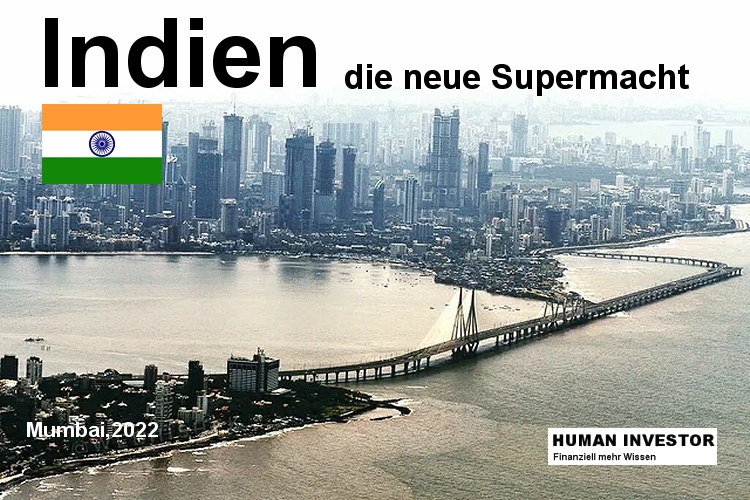
But there are also global institutions that have been created to enforce international humanitarian law.
Yes, but their balance of power no longer reflects today’s world order. Why is England a permanent member of the UN Security Council and India or Brazil are not? Sometimes the global institutions are simply ignored if they don’t suit you. The US does not recognize the International Tribunal for the Law of the Sea but requires China to comply in the South China Sea. Or majority decisions by the United Nations are simply ignored in the West. If, as happened recently, there is a clear majority in the UN Human Rights Council against unilateral sanctions, which are mainly imposed by Western states, then this is a historic decision by the majority of the world.
In the West, people act as if nothing has happened because they want sanctions against Putin, even if the majority of the world does not support them and therefore they do not take effect.
What role will the military play in the coming years and in this global showdown?
I think we now have the chance to stop large countries from going it alone unilaterally. That would be a huge advance in civilization. That would mean that no matter what country invades another country, without UN approval, the majority of the world will have it against them. The majority of the world should now agree on this. It won’t be easy, but the chances are better than ever.
